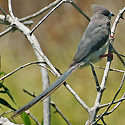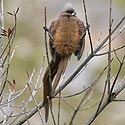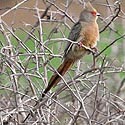|
Family: Coliidae (mousebirds)
Life
> Eukaryotes >
Opisthokonta
> Metazoa (animals) >
Bilateria >
Deuterostomia > Chordata >
Craniata > Vertebrata (vertebrates) > Gnathostomata (jawed
vertebrates) > Teleostomi (teleost fish) > Osteichthyes (bony fish) > Class:
Sarcopterygii (lobe-finned
fish) > Stegocephalia (terrestrial
vertebrates) > Tetrapoda
(four-legged vertebrates) > Reptiliomorpha > Amniota >
Reptilia (reptiles) >
Romeriida > Diapsida > Archosauromorpha > Archosauria >
Dinosauria
(dinosaurs) > Saurischia > Theropoda (bipedal predatory dinosaurs) >
Coelurosauria > Maniraptora > Aves
(birds) > Order: Coliiformes
Species indigenous to southern Africa
|
Colius
colius (White-backed mousebird) The
White-backed mousebird is endemic, being found mainly in South Africa and
Namibia. It prefers to live in sparse woodland, often with a river nearby,
also farmyards, gardens and orchards. It eats plant matter - mainly fruit
but also leaves, flowers, shoots and nectar. The nest is built by both
sexes, and is a scruffy bowl made of twigs, leaves and grass. It lays 1-6
eggs, which are incubated by both parents, for 11-13 days. Strangely, the
chicks are brooded non-stop, from when they hatch to when they leave the
nest. In captivity, the chicks stay in the nest for 11-20 days, becoming
independent at about 21 days old. |
 |
|
Colius
striatus (Speckled mousebird) The
Speckled mousebird is common in South Africa and Mozambique, where it is
common in suburban gardens. It is highly adaptable, and can be found in many
types of habitats. It feeds on plant matter, mainly fruit, but also leaves,
nectar and buds. The breeding pair is helped by 2-6 helpers, normally half
of which are not related. The nest is a small bowl of grass, lined with soft
material. It lays 1-7 eggs, which are incubated by both sexes, for 12-15
days. The nestlings start to explore the branches surrounding the nest at
10-11 days, staying in the nest for the first 4-10 days more, after which
they become independent. |
 |
|
Urocolius
indicus (Red-faced mousebird) The
Red-faced mousebird is locally common in all countries in southern Africa,
and lives in a wide variety of habitats. It feeds mainly on fruit, with
flowers largely making up the rest of its diet. The nest is a small cup of
twigs, leaves and stems, placed 2-8 metres above ground in a tree or bush.
It lays 1-7 eggs, which are incubated for 14-20 days, by both sexes and
sometimes a helper. The chicks are brooded for the first few days of their
life, sometimes by both adults at once. They stay in the nest for 14-20
days, before becoming independent. |
 |
|
